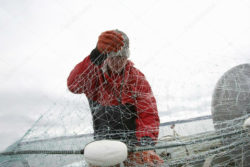Top Class Actions’s website and social media posts use affiliate links. If you make a purchase using such links, we may receive a commission, but it will not result in any additional charges to you. Please review our Affiliate Link Disclosure for more information.

Fortunately, there are laws in place to protect you from injuries sustained at sea. One of the most significant is the Jones Act, which covers a series of accidents that employees may suffer as maritime workers.
If you or someone you love has suffered from injuries as a worker on a commercial vessel, you may be able to pursue litigation through Jones Act claims.
Filing Jones Act Claims
Now almost a hundred years old, the Jones Act was passed by Congress in 1920 to help protect maritime workers from injuries suffered while working at sea.
In order to be qualified as a Jones Act seaman, a worker must spend at least 30 percent of their time working on a vessel or group of vessels under common ownership. Workers eligible for Jones Act claims include crew members, officers, captains, and masters.
If you are a qualified seaman under the rules of the Jones Act, you must follow a few particular steps to properly make Jones Act claims against your employer. Under this law, the burden of proof is on the plaintiff, so following the process exactly is essential.
Any injury that occurs while working on a vessel must be reported immediately to your superior. There is a time limit of seven days to report a work-related injury for Jones Act claims under federal law, but in order to get the process moving quickly, it is best to report an injury as soon as it is feasible.
Medical documentation is also necessary to make Jones Act claims, so even if the injury is (or seems to be) minor, consult your physician, emergency medical personnel, or the ship’s medical officer. It’s important to note that even a small injury could develop into something much more serious, like an infection, or may have been more serious in the first place but remained undetected. Therefore, acting early is always a good idea.
The accident should also be entered into the ship log by the captain, as well as filed in a Report of Marine Accident, Injury, or Death. A maritime attorney familiar with Jones Act claims can help you through this process.
Accidents covered with Jones Act claims include the following:
- Capsizing
- Collisions
- Fires
- Explosions
- Accidents caused by rough seas
- Slips and falls
- Food poisoning
- Falling objects
- Injuries during construction
- Others
Other Maritime Law
There are also other major maritime laws meant to protect those working at sea. Also in 1920, the Death on the High Seas Act was passed, which provides compensation to spouses or dependents if a worker is killed in international waters because of negligence or the vessel’s own unseaworthiness.
The Longshore and Harbor Worker’s Compensation Act is another federal law protecting maritime workers, protecting those who sustain offshore workers who are injured while working on a waterway or repairing, loading, building, or unloading vessels.
Joining the Maritime Lawsuit Investigation
You may be able to join this maritime lawsuit investigation if you or someone you love has suffered from an offshore injury as a worker on a commercial vessel, or if you suffered from sexual harassment or discrimination as a maritime worker.
If you sustained an offshore injury as a worker on a commercial vessel or you were subjected to sexual harassment or discrimination as a maritime worker, you may qualify to join this maritime lawsuit investigation.
Fill out the FREE form on this page for more information.
ATTORNEY ADVERTISING
Top Class Actions is a Proud Member of the American Bar Association
LEGAL INFORMATION IS NOT LEGAL ADVICE
Top Class Actions Legal Statement
©2008 – 2024 Top Class Actions® LLC
Various Trademarks held by their respective owners
This website is not intended for viewing or usage by European Union citizens.
Get Help – It’s Free
Join a Free Offshore Injury Lawsuit Investigation
If you qualify, an attorney will contact you to discuss the details of your potential case at no charge to you.
PLEASE NOTE: If you want to participate in this investigation, it is imperative that you reply to the law firm if they call or email you. Failing to do so may result in you not getting signed up as a client or getting you dropped as a client.
Oops! We could not locate your form.












